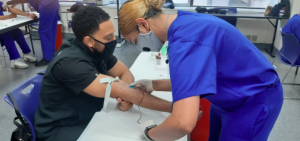Tips for a successful Medical Assistant externship
Externships are temporary training programs in a workplace, which provide important experience and hands on learning. The Medical Assistant externship is extremely important for getting you career ready. As a Medical Assistant extern, you are expected to carry out the duties that you were taught in your training program, but you’ll also learn some new tricks of the trade! The capability to execute your learning potential is certainly important, however you need to show you’re a team player and open to learning new things. It’s very important to utilize proper interpersonal skills, maintain a professional look and exhibit a superior attitude at your externship site for rewarding success. Here are some more tips for success on your Externship:
- 1. Concentrate on your appearance
Dress professionally. You should wear professional work attire when interviewing for your Externship. Once assigned a site, all Medical Assistants are expected to maintain a clean, tidy and professional look.
- 2. Understand the rules and guiding principles
When you step into a medical facility as an extern, remember that you are considered a ‘visitor’ at that facility. You will be expected to follow their policies, so it is always better to read and understand the workplace policy manual thoroughly for the first few days of your training. Make sure to take notes and consider your externship as a hands-on job interview.
- 3. Be reliable and punctual
A Medical Assistant externship provides you with a great opportunity to establish your reliability, loyalty and competencies as a medical professional. Promptness and timeliness are the best indicators that establish your dependability. As an extern, you should always be enthusiastic and prepared to help out with front office duties. At times you will be expected to answer the phone, do some administrative tasks and assist the medical team so being on time affects not only you but your team as well.
- 4. Follow instructions carefully
During the first few days of your externship, you will be treated in the same way as a new employee. You will be provided with some simple duties in the first few days. This is to make an assessment of your ability to follow straightforward directions and perform proficiently. Your day to day responsibilities, tasks and duties will soon increase both in significance and meaning as the externship program moves forward.
- 5. Resolve issues in a professional approach
If you come across a difficult situation at your externship site, contact your school’s Career Service Advisors. As a student, you should learn the appropriate ways to deal with all administrators and managers and try hard to resolve each and every single issue professionally. Always remember your Career Service team is there to guide you toward a successful externship.
- 6. Maintain confidentiality
Medical records are private and are never to be discussed with anyone besides the patient and their medical team. Not only is it ethical, but it is the law.
- 7. Don’t forget to convey your thanks
It’s always a good idea to send a ‘Thank you’ note to your site, for giving you an opportunity to accomplish your externship at their medical facility; this will create a good impression.
To learn more about our health care programs and externships, contact the Allen School today! At the Allen School of Health Sciences, we are devoted to fostering positivity, empathy, professionalism, and integrity in our future graduates.
In order to protect our community during the COVID-19 crisis, The Allen School of Health Sciences is offering virtual campus tours for enrollment for our classes starting soon. Contact the Allen School today! We cannot wait for you to become part of the Allen School family. Visit www.allenschool.edu to learn more.
-Allen School


